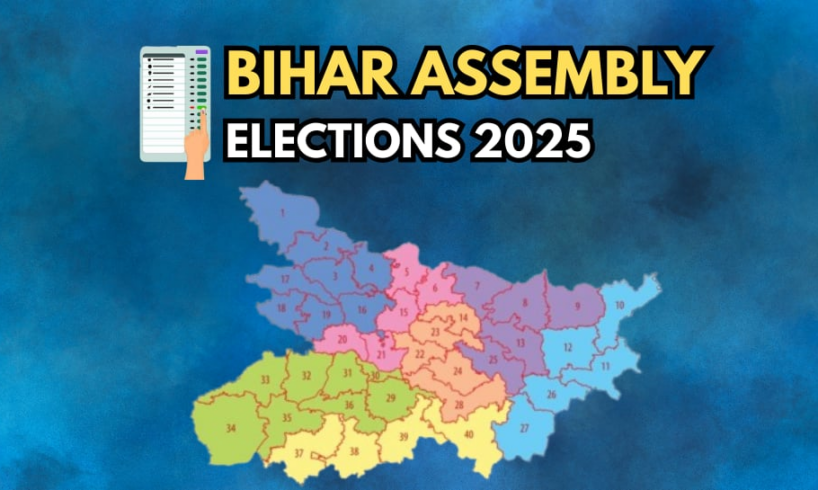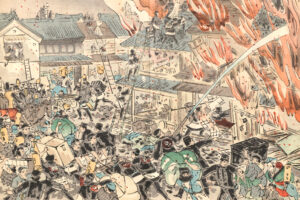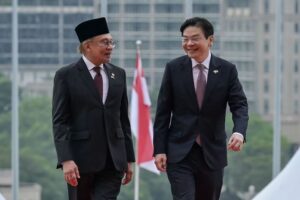
Bihar Assembly Polls 2025: In Bihar, where politics is woven into every whisper of the wind and caste is more than identity, the countdown to the November 2025 elections is building toward a storm. While the BJP-JD(U) axis is suddenly facing a crisis not from the opposition — but from within, Prime Minister Narendra Modi has flipped the script by knocking off the Opposition’s ‘vote chori’ narrative with a single emotional stroke, invoking his late mother in response to a viral abuse video, and turning a personal insult into a full-blown electoral weapon.
From a distance, it may seem that the INDIA bloc’s ‘Voter Adhikar’ Yatra is the main pressure on the ruling National Democratic Alliance (NDA). But up close, the real strain is coming from within as its key allies, Chirag Paswan and Jitan Ram Manjhi, who are reportedly demanding a larger share of the political pie, threatening to fracture the coalition that has so far held power through a delicate caste-based arithmetic.
Ambitions Rising: Chirag And Manjhi Demand More
Add Zee News as a Preferred Source
Chirag Paswan, leader of the Lok Janshakti Party (Ram Vilas), is riding high after his party swept all five Lok Sabha seats it contested in 2024. A scion of the late Dalit icon Ram Vilas Paswan, Chirag now wants up to 40 seats out of Bihar’s 243 assembly constituencies. Reportedly, he’s also warned he could contest all seats independently if his demands are not met, a move seen less as a bluff and more as a demonstration of his increasing influence, particularly among the Paswan community.
Meanwhile, the state’s former chief minister Jitan Ram Manjhi has made it clear that his Hindustani Awam Morcha (Secular), buoyed by his 2024 Lok Sabha victory from Gaya, will not settle for crumbs. He wants full control over seats in Gaya and Aurangabad districts, areas where his Mahadalit support base, particularly the Mushahar community, is strongest. Now 79, Manjhi is leveraging his renewed electoral relevance to bargain hard with the NDA’s core parties.
BJP And JD(U) Caught In Crossfire
The BJP and Janata Dal (United), the NDA’s twin pillars in Bihar, are struggling to maintain cohesion amid the growing demands. In the 2020 assembly polls, the NDA won 125 of 243 seats, the BJP taking 74 (with a 19.46% vote share), and JD(U) 43 (15.39%). At that time, Chirag’s LJP ran separately, contesting 135 seats, often cutting into JD(U) votes, but winning only one (Matihani in Begusarai).
Yet, the 2024 general elections revealed a more unified NDA — BJP and JD(U) bagged 12 seats each, LJP (Ram Vilas) 5, and Manjhi’s HAM 1, a collective haul of 30 out of Bihar’s 40 seats. But the INDIA bloc, led by the RJD-Congress alliance, won 9 seats, and RJD’s growing 22.62% vote share remains a threat.
Chirag’s 6.59% vote share in 2024, largely concentrated among Paswans, and Manjhi’s 1.16% in Gaya, highlight the caste vote-bank power both leaders wield. For the BJP, which leans on upper-caste and non-Yadav OBC votes, and the JD(U), which draws heavily from Kurmis and EBCs, these allies are both assets and liabilities.
Also Read: Bihar Bandh: NDA Shuts Down State For 5-Hours Over ‘Abusive’ Remarks Against PM Modi | Check What’s Open, What’s Closed
Cracks In The Coalition
The proposed NDA seat-sharing formula, BJP 101, JD(U) 102, LJP (Ram Vilas) 20, HAM 10, and Rashtriya Lok Morcha 10, has hit turbulence. Chirag wants 40 seats. Manjhi is firm on Gaya and Aurangabad. JD(U) is reluctant to cede ground in those regions. The BJP now faces a strategic conundrum — accommodate ally demands and risk weakening its own tally or stand firm and face potential rebellion.
Adding to the tension, Nitish Kumar, in his ninth term as chief minister, has become a double-edged sword. While his governance experience is valued, concerns over his health and recent verbal slip-ups have sparked speculation about his future. The BJP’s silence on naming a CM face has only fuelled whispers about possible shifts in leadership after the polls.
PM Modi Flips Opposition Attack Into Campaign Pivot
As the NDA grapples with internal challenges, Prime Minister Narendra Modi has dramatically reshaped the electoral narrative. At a recent public address following the launch of a women-centric welfare scheme, Modi invoked a viral video from an RJD-Congress campaign event where abuses were hurled at him, and allegedly at his late mother, Heeraben Modi.
“My mother, who had nothing to do with politics, was subjected to vile abuses from the RJD-Congress platform,” Modi said in an emotional speech, adding, “This is deeply saddening, painful, and distressing… I may forgive the insult to my mother, but Bihar will not. These abuses target every mother in the country.”
The video and the Prime Minister’s response have set off a wave of protests led by BJP workers across Bihar. A Bihar bandh has also been called. Visuals of women protesting against the slurs suggest Modi’s remarks have struck a chord, particularly among women voters, a group that has consistently outvoted men since the 2010 assembly elections, largely thanks to Nitish Kumar’s women-friendly policies like prohibition.
A Familiar Political Playbook
This isn’t the first time Modi has turned personal attacks into electoral advantages. From “neech” and “maut ka saudagar” to “zahrila saanp” and “pickpocket”, he has faced a slew of insults over the years and used them to craft narratives of victimhood, resilience, and identification with the common man.
Ahead of the 2014 Lok Sabha election, Congress veteran Mani Shankar Aiyar dismissed Modi as fit only to serve tea. Modi ran with the “chaiwallah” identity, turning it into a symbol of grassroots pride. In 2007, Sonia Gandhi’s “maut ka saudagar” remark in Gujarat backfired. The 2019 “Chowkidar Chor Hai” campaign ended in another BJP sweep.
Now, with the 2025 Bihar elections approaching, Modi’s emotional counterstrike to the RJD-Congress’s “vote chori” campaign, centred on alleged voter list tampering, has effectively changed the conversation.
Battle Lines Drawn
The opposition has tried to downplay the incident, insisting no senior leaders were present during the slogan-shouting. But the damage may already be done. Modi’s words have found fertile ground among women and older voters. The BJP-JD(U) combine is capitalising on the outrage, portraying it as an assault not just on the PM, but on Indian motherhood itself.
Meanwhile, the RJD continues its strategic moves, recruiting Chirag Paswan’s estranged uncle Pashupati Kumar Paras and eyeing discontent among NDA allies. Their MY-BAAP strategy (Muslim-Yadav-Bahujan-Agda-Aadhi Abaadi-Poor) remains a potent counterweight.
An Unpredictable Road To November
As monsoon clouds gather over Bihar, so do uncertainties over the NDA’s future. The alliance’s success will hinge on how well it balances competing egos, caste equations, and public sentiment. Chirag Paswan’s rebellion could splinter Dalit votes. Manjhi’s withdrawal could cost the Mahadalit strongholds. Nitish Kumar’s diminished aura adds to the unease.
But in a state where politics is inseparable from history, caste, and personal ambition, nothing can be taken for granted. The Prime Minister may have seized the emotional high ground, but whether that translates into votes and whether the NDA can present a united front will only be revealed when ballots are counted.





